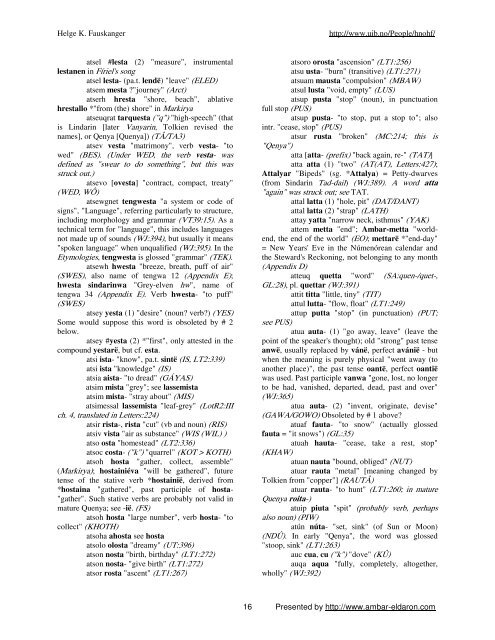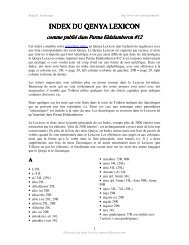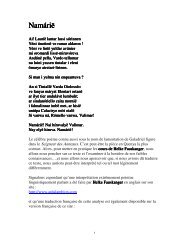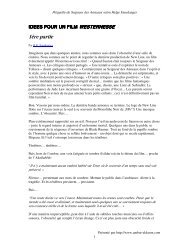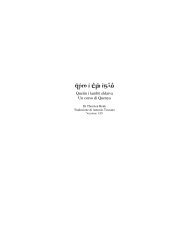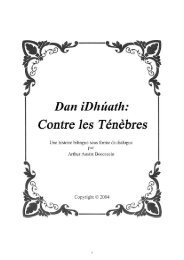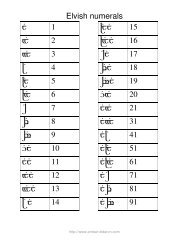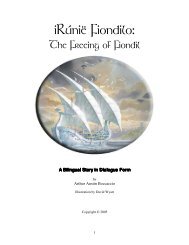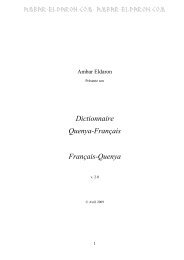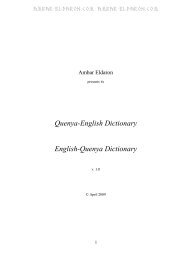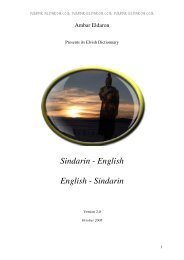Quenya Reverse Wordlist - Ambar Eldaron
Quenya Reverse Wordlist - Ambar Eldaron
Quenya Reverse Wordlist - Ambar Eldaron
Create successful ePaper yourself
Turn your PDF publications into a flip-book with our unique Google optimized e-Paper software.
Helge K. Fauskanger http://www.uib.no/People/hnohf/<br />
atsel #lesta (2) "measure", instrumental<br />
lestanen in Fíriel's song<br />
atsel lesta- (pa.t. lendë) "leave" (ELED)<br />
atsem mesta ?"journey" (Arct)<br />
atserh hresta "shore, beach", ablative<br />
hrestallo *"from (the) shore" in Markirya<br />
atseuqrat tarquesta ("q") "high-speech" (that<br />
is Lindarin [later Vanyarin, Tolkien revised the<br />
names], or Qenya [<strong>Quenya</strong>]) (TÂ/TA3)<br />
atsev vesta "matrimony", verb vesta- "to<br />
wed" (BES). (Under WED, the verb vesta- was<br />
defined as "swear to do something", but this was<br />
struck out.)<br />
atsevo [ovesta] "contract, compact, treaty"<br />
(WED, WÔ)<br />
atsewgnet tengwesta "a system or code of<br />
signs", "Language", referring particularly to structure,<br />
including morphology and grammar (VT39:15). As a<br />
technical term for "language", this includes languages<br />
not made up of sounds (WJ:394), but usually it means<br />
"spoken language" when unqualified (WJ:395). In the<br />
Etymologies, tengwesta is glossed "grammar" (TEK).<br />
atsewh hwesta "breeze, breath, puff of air"<br />
(SWES), also name of tengwa 12 (Appendix E);<br />
hwesta sindarinwa "Grey-elven hw", name of<br />
tengwa 34 (Appendix E). Verb hwesta- "to puff"<br />
(SWES)<br />
atsey yesta (1) "desire" (noun? verb?) (YES)<br />
Some would suppose this word is obsoleted by # 2<br />
below.<br />
atsey #yesta (2) *"first", only attested in the<br />
compound yestarë, but cf. esta.<br />
atsi ista- "know", pa.t. sintë (IS, LT2:339)<br />
atsi ista "knowledge" (IS)<br />
atsia aista- "to dread" (GÁYAS)<br />
atsim mista "grey"; see lassemista<br />
atsim mista- "stray about" (MIS)<br />
atsimessal lassemista "leaf-grey" (LotR2:III<br />
ch. 4, translated in Letters:224)<br />
atsir rista-, rista "cut" (vb and noun) (RIS)<br />
atsiv vista "air as substance" (WIS (WIL) )<br />
atso osta "homestead" (LT2:336)<br />
atsoc costa- ("k") "quarrel" (KOT > KOTH)<br />
atsoh hosta "gather, collect, assemble"<br />
(Markirya); hostainiéva "will be gathered", future<br />
tense of the stative verb *hostainië, derived from<br />
*hostaina "gathered", past participle of hosta-<br />
"gather". Such stative verbs are probably not valid in<br />
mature <strong>Quenya</strong>; see -ië. (FS)<br />
atsoh hosta "large number", verb hosta- "to<br />
collect" (KHOTH)<br />
atsoha ahosta see hosta<br />
atsolo olosta "dreamy" (UT:396)<br />
atson nosta "birth, birthday" (LT1:272)<br />
atson nosta- "give birth" (LT1:272)<br />
atsor rosta "ascent" (LT1:267)<br />
16<br />
atsoro orosta "ascension" (LT1:256)<br />
atsu usta- "burn" (transitive) (LT1:271)<br />
atsuam mausta "compulsion" (MBAW)<br />
atsul lusta "void, empty" (LUS)<br />
atsup pusta "stop" (noun), in punctuation<br />
full stop (PUS)<br />
atsup pusta- "to stop, put a stop to"; also<br />
intr. "cease, stop" (PUS)<br />
atsur rusta "broken" (MC:214; this is<br />
"Qenya")<br />
atta [atta- (prefix) "back again, re-" (TAT)]<br />
atta atta (1) "two" (AT(AT), Letters:427);<br />
Attalyar "Bipeds" (sg. *Attalya) = Petty-dwarves<br />
(from Sindarin Tad-dail) (WJ:389). A word atta<br />
"again" was struck out; see TAT.<br />
attal latta (1) "hole, pit" (DAT/DANT)<br />
attal latta (2) "strap" (LATH)<br />
attay yatta "narrow neck, isthmus" (YAK)<br />
attem metta "end"; <strong>Ambar</strong>-metta "worldend,<br />
the end of the world" (EO); mettarë *"end-day"<br />
= New Years' Eve in the Númenórean calendar and<br />
the Steward's Reckoning, not belonging to any month<br />
(Appendix D)<br />
atteuq quetta "word" (SA:quen-/quet-,<br />
GL:28), pl. quettar (WJ:391)<br />
attit titta "little, tiny" (TIT)<br />
attul lutta- "flow, float" (LT1:249)<br />
attup putta "stop" (in punctuation) (PUT;<br />
see PUS)<br />
atua auta- (1) "go away, leave" (leave the<br />
point of the speaker's thought); old "strong" past tense<br />
anwë, usually replaced by vánë, perfect avánië - but<br />
when the meaning is purely physical "went away (to<br />
another place)", the past tense oantë, perfect oantië<br />
was used. Past participle vanwa "gone, lost, no longer<br />
to be had, vanished, departed, dead, past and over"<br />
(WJ:365)<br />
atua auta- (2) "invent, originate, devise"<br />
(GAWA/GOWO) Obsoleted by # 1 above?<br />
atuaf fauta- "to snow" (actually glossed<br />
fauta = "it snows") (GL:35)<br />
atuah hauta- "cease, take a rest, stop"<br />
(KHAW)<br />
atuan nauta "bound, obliged" (NUT)<br />
atuar rauta "metal" [meaning changed by<br />
Tolkien from "copper"] (RAUTÂ)<br />
atuar rauta- "to hunt" (LT1:260; in mature<br />
<strong>Quenya</strong> roita-)<br />
atuip piuta "spit" (probably verb, perhaps<br />
also noun) (PIW)<br />
atún núta- "set, sink" (of Sun or Moon)<br />
(NDÛ). In early "Qenya", the word was glossed<br />
"stoop, sink" (LT1:263)<br />
auc cua, cu ("k") "dove" (KÛ)<br />
auqa aqua "fully, completely, altogether,<br />
wholly" (WJ:392)<br />
Presented by http://www.ambar-eldaron.com


